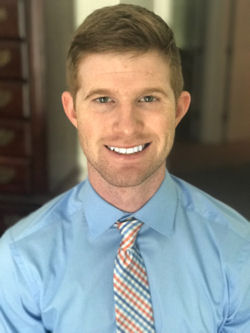By Jean-Luc Banks
This essay was written to gather my thoughts after I completed my first autopsy. As a child still grieving the loss of a parent, I knew this experience would be difficult for me. Furthermore, I found no resources detailing the experiences of medical students completing their autopsies while still grieving the loss of a loved one. I felt alone. I wrote this to share my experience during the autopsy so no other students out there will ever feel as alone as I did.
To: The Person on the Autopsy Table
A cold, steel table. Your body lying on it. Cold but also with color. Not blue like I expected from television. Young, like I am. This made it even harder. A life cut short. How? I really didn't want to know. But this is what I was here to find out.
This is the purpose of an autopsy. I was here to watch your autopsy. I thought I knew you, but maybe I didn't. Your abdomen was open, and your intestines were poking out. Your face was white and solemn. It was clear that your death was sudden, tragic. My heart ached for your family, as I remember that pain clearly. How I never imagined that it would be someone as young as you on this table. My father found himself on this very same table just a few years ago, and he was almost double your age. His death was sudden and tragic, as well. You two had that in common.
As they cut into your body, I stayed back. Trying not to get in the way but also trying to distance myself—physically and emotionally. The pathologist called me over wanting me to look inside your body cavity. Your body cavity. There were hemorrhages everywhere. The vasculature within your chest wall had ruptured and created firework-like displays all over your parietal pleura. It was beautiful. But also sickening. Sickening that this was happening to you. Sickening that I thought this was beautiful. Sickening that the person cutting into you just kept going, pulling out your heart and lungs, without even knowing you. Asking me to hold them. I imagined this happening to my dad. The pathology intern making a V-shaped incision through the tattoos on his chest wondering who this “Jean-Luc” was whose name was tattooed over his heart. I thought I was going to vomit from behind my N95 respirator. As I tried to pass along your organs as quickly as possible without dropping them on the cold floor, I also tried not to look at you. Exposed as you were.
As the pathologist cut farther through your body cavity, he started asking me questions. What was this vessel? And what came off the end of this organ? We in medicine call this “pimping.” A nasty word. I couldn't think. I mumbled some incorrect artery, and we moved on. I thought this was over; it was not. Every 30 seconds or so, I was asked again and again to identify something. This was a learning opportunity after all, and I should be grateful for it. But I didn't feel like learning. I didn't feel like anything. I didn't feel at all.
As we began weighing organs, I moved away from your body, hoping that I would never have to return to it. I could focus on your kidneys and not attribute them to you. They were simply kidneys. Just like the ones I had seen in cadaver lab. Ones I had held in my hands many times and traced their vasculature through to the inferior vena cava. This was better. This was safe. I could do this.
The sound of a saw forced me to look over as they started cutting through your head. I didn't know this was going to happen. I got scared. I tried to maintain my focus on your kidneys, but my attention and gaze kept shifting back to you. As they took out your brain, I wondered what your last thoughts were. I wondered if you knew you were going to die. I wondered if my dad knew he was going to die. I wondered where you both were now. As they cut into your brain to look for emboli, I excused myself and left. I couldn't do this anymore. I was done.
I want to thank you because you helped me that day. I didn't see my dad on that cold, steel table as I spent many nights fearing that I would. Instead, I saw you. As I move into clinical medicine and experience the death of my patients, I wonder if I will see you again. Or will I see him? Or will I carry each patient's death around me like a weight in my heart? I don't know.

Jean-Luc Banks
University of North Carolina, Chapel Hill
Graduating Class of 2022

